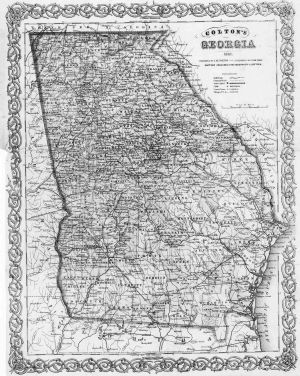 Some Southern Baptist soldiers succumb to illnesses early in the war, leaving the battlefield behind and returning to the home front. Such is the case of Rufus Wiley Phillips, a graduate of Georgia Baptists’ Mercer University.
Some Southern Baptist soldiers succumb to illnesses early in the war, leaving the battlefield behind and returning to the home front. Such is the case of Rufus Wiley Phillips, a graduate of Georgia Baptists’ Mercer University.
Weeks prior, Phillips, a Junior 2nd Lieutenant in a Lowndes County (GA) unit, was discharged from Confederate service in Richmond. Today, he formally resigns, his Confederate service seemingly over only months after the war began. Yet, in a strange twist of fate, Phillip’s role in southern history is just beginning.
During the remaining war years, there is some indication that Phillips serves another stint with the Confederate army in the Savannah area. After the South surrenders, Phillips, an attorney prior to the war, settles in Echols County. There, he is involved in Georgia politics from 1868 to 1876 as a Democrat State Assembly Representative from Echols County. At this time, southern Reconstruction is yet underway, and Republicans control the politics of southern states. Republican Rufus Bullock, in 1868, is elected as Georgia’s governor, while Republicans control the state Senate and Democrats (old guard whites) cling to a slim majority in the House. One year later, Georgia legislatures refuse to ratify the 15th Amendment (franchising African American men). By the end of the year, U.S. President Ulysses S. Grant intervenes to force the state of Georgia to comply with Reconstruction policies.
Against this backdrop, on January 10, 1870, State Senator Rufus W. Phillips is tried by U.S. military court. The Grant administration, wishing to remove Confederates from state office, charges Phillips with being a public official in 1861 (he was mayor of Valdosta – Lowndes County – and a notary public) who joined the Confederate Army and served as an officer, giving “aid and comfort to the enemies of the United States, in that he held the office of adjutant of a regiment organized and acting in hostility to the United States.” As such, Phillips is in violation of the 14th Amendment, which prohibits former southern political officials (including at the state level) who had joined the Confederacy, from serving in political positions during Reconstruction.
Unlike many Reconstruction-era southern Democrats who are targeted by the Grant administration during Reconstruction, the wily Phillips mounts a solid defense and, the following month, the charges against him are dropped. Phillips then serves out his term, a respected state politician across party lines.
Choosing not to run for re-election, Phillips in 1876 leaves Georgia politics and moves, with his family, to Hamilton County, Florida. There he teaches school until, in the 1880s, he is appointed by Florida Governor Edward A. Perry as a judge in Suwannee County. Establishing an 80 acre homestead in Suwannee County, Phillips begins a journey from being a Baptist layman to serving as a preacher. Helping establish the Suwannee Station Baptist Church, he serves as a preacher, before passing away in 1903.
Sources: Jesse H. Campbell, Georgia Baptists: Historical and Biographical (Macon, Ga.: J. W. Burke, 1874), p. 150 (link); Tom Hutchison, “The Trial of R. W. Phillips” (link); Henry W. Thomas, History of the Doles-Cook Brigade of Northern Virginia, C.S.A. (Atlanta: Franklin Printing and Publishing, 1903), p. 317 (link)


